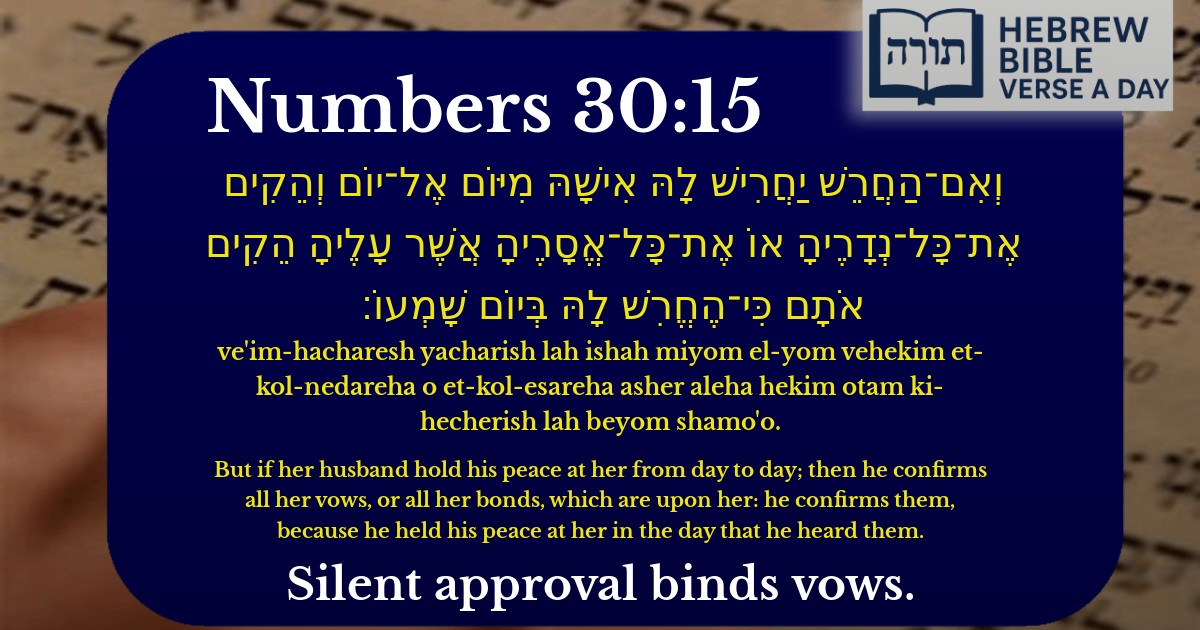Join Our Newsletter To Be Informed When New Videos Are Posted
Join the thousands of fellow Studends who rely on our videos to learn how to read the bible in Hebrew for free!
Hebrew Text
וְאִם־הַחֲרֵשׁ יַחֲרִישׁ לָהּ אִישָׁהּ מִיּוֹם אֶל־יוֹם וְהֵקִים אֶת־כָּל־נְדָרֶיהָ אוֹ אֶת־כָּל־אֱסָרֶיהָ אֲשֶׁר עָלֶיהָ הֵקִים אֹתָם כִּי־הֶחֱרִשׁ לָהּ בְּיוֹם שָׁמְעוֹ׃
English Translation
But if her husband hold his peace at her from day to day; then he confirms all her vows, or all her bonds, which are upon her: he confirms them, because he held his peace at her in the day that he heard them.
Transliteration
Ve'im-hacharesh yacharish lah ishah miyom el-yom vehekim et-kol-nedareha o et-kol-esareha asher aleha hekim otam ki-hecherish lah beyom shamo'o.
Hebrew Leining Text
וְאִם־הַחֲרֵשׁ֩ יַחֲרִ֨ישׁ לָ֥הּ אִישָׁהּ֮ מִיּ֣וֹם אֶל־יוֹם֒ וְהֵקִים֙ אֶת־כׇּל־נְדָרֶ֔יהָ א֥וֹ אֶת־כׇּל־אֱסָרֶ֖יהָ אֲשֶׁ֣ר עָלֶ֑יהָ הֵקִ֣ים אֹתָ֔ם כִּי־הֶחֱרִ֥שׁ לָ֖הּ בְּי֥וֹם שׇׁמְעֽוֹ׃


Context in Torah
This verse (Bamidbar 30:15) appears in the section discussing the laws of vows (nedarim) and the husband's ability to annul or uphold his wife's vows. The Torah establishes that a husband has the authority to confirm or nullify certain vows made by his wife, provided he does so on the same day he hears them.
Rashi's Explanation
Rashi explains that if the husband remains silent ("וְאִם־הַחֲרֵשׁ יַחֲרִישׁ") from the day he hears the vow until the next day ("מִיּוֹם אֶל־יוֹם"), he can no longer annul the vow. His silence is considered implicit confirmation ("הֵקִים אֶת־כָּל־נְדָרֶיהָ"), and the vow stands as if he actively upheld it. Rashi emphasizes that the husband's window for annulment is strictly limited to the day he hears the vow (based on Sifrei Bamidbar 153).
Rambam's Halachic Perspective
In Hilchos Nedarim (12:7), Rambam codifies this law, stating that if a husband hears his wife's vow and does not annul it on that day, the vow becomes binding. The phrase "מִיּוֹם אֶל־יוֹם" teaches that the 24-hour period from when he first heard it constitutes "the day of hearing," after which his silence confirms the vow.
Talmudic Analysis (Nedarim 77b)
The Talmud discusses whether "מִיּוֹם אֶל־יוֹם" refers to:
Halacha follows Beis Hillel, meaning the husband has exactly 24 hours from when he first hears the vow to annul it.
Midrashic Insight (Sifrei)
The Sifrei notes that the double language of "הַחֲרֵשׁ יַחֲרִישׁ" teaches that the husband's silence must be complete - he cannot partially object or express uncertainty. Either he explicitly nullifies the vow on that day, or his total silence confirms it.
Practical Implications
This verse establishes important principles in halacha: